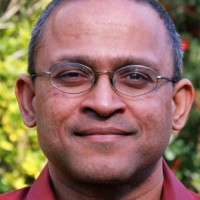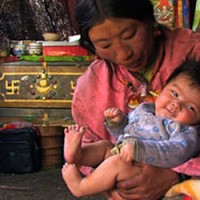At home in Chinatown, at home in Tibet – a double feature
 By Ravi Chandra
By Ravi Chandra
If I could hear neurons firing, they must sound like the live musical accompaniment by Jack Tung and Arthur Yeung for SUITE SUITE CHINATOWN. Neurons fired, and patches of grey matter lit up: memories, habits, foods, families – a “mind space” of Chinatown, as Supervisor David Chiu put it in the panel discussion afterwards, moderated by CAAM Board Member Dr. Konrad Ng. Seven short films – from abstract and experimental to humorous, animated “lip synchs” – created a kind of video poem of Canada’s Chinatown experience. Film contributor Heather Keung says she works “at the border of the familiar and the inaccessible”, which is an apt description of the unique compilation itself. I saw snapshots of Chinatown, familiar holding stations for identity, comfortable and meaningful as a well-lived home. Even stockpiled plastic bags and soy sauce packets pointed to meaning – not just evidence of “frugality” or detritus of daily life, but as tracings of a way of life, etchings of the personalities of people we love. We all laughed – the filmmakers made us all insiders. The “inaccessible” might be simply hard to understand, or requiring contemplation – but I think it also refers to a state of pure awareness of all the places and objects of attachment and origin. We can feel the tugs of connection – vital gravitations – and affirm our connection to them.
 SUMMER PASTURE held a similar tug for me. Instead of Chinatown, there was the rooftop of the world, high Tibet. Directors Lynn True, Nelson Walker and Tsering Perlo captured the essence of the nomadic life in Kham, eastern Tibet, a way of life that has existed for 4,000 years. It’s a life intimately connected to the land, the yaks, the sky and rivers, and it seems happy, deep and peaceful, if physically difficult. The nearest town is six hours away. The wife says when she goes to town, she feels “like an animal” – she’s unable to read the signs written in Chinese, and must feel like a displaced person inside her own homeland. There are reasons to move to town; change is inevitable here, too. I wonder what will be the holding stations of identity for these people. Religion? They will forget the yak-milking songs and the way to make rope. What will take their place? “You can chant all you want,” says the wife, “but it is more important to be compassionate.” I hope that this wisdom survives modernity. It is as relevant for Chinatown as much as Kham.
SUMMER PASTURE held a similar tug for me. Instead of Chinatown, there was the rooftop of the world, high Tibet. Directors Lynn True, Nelson Walker and Tsering Perlo captured the essence of the nomadic life in Kham, eastern Tibet, a way of life that has existed for 4,000 years. It’s a life intimately connected to the land, the yaks, the sky and rivers, and it seems happy, deep and peaceful, if physically difficult. The nearest town is six hours away. The wife says when she goes to town, she feels “like an animal” – she’s unable to read the signs written in Chinese, and must feel like a displaced person inside her own homeland. There are reasons to move to town; change is inevitable here, too. I wonder what will be the holding stations of identity for these people. Religion? They will forget the yak-milking songs and the way to make rope. What will take their place? “You can chant all you want,” says the wife, “but it is more important to be compassionate.” I hope that this wisdom survives modernity. It is as relevant for Chinatown as much as Kham.
Perhaps it’s odd to find resonance between Chinatown and Tibet, but the resonances are there, and it seems necessary. Home is best defined by the people who live there; but filmmakers help show us all the importance of those homes, and then those homes find a place within us. But home is only home if it is upheld and validated as a place of safety and belonging. These two film programs provided that validation, and provide motivation for our work to support people from next door and at the rooftop of the world.
As filmmaker Aram Sui Wai Collier said about the artists’ process for SUITE SUITE CHINATOWN, we have to “come together like Voltron and make something bigger than ourselves!”
Ravi Chandra, M.D. is a psychiatrist and writer in San Francisco. He invites you to check out his new, occasional blog, The Pacific Heart, at Psychology Today, and consider adding him to your newsfeed.,




